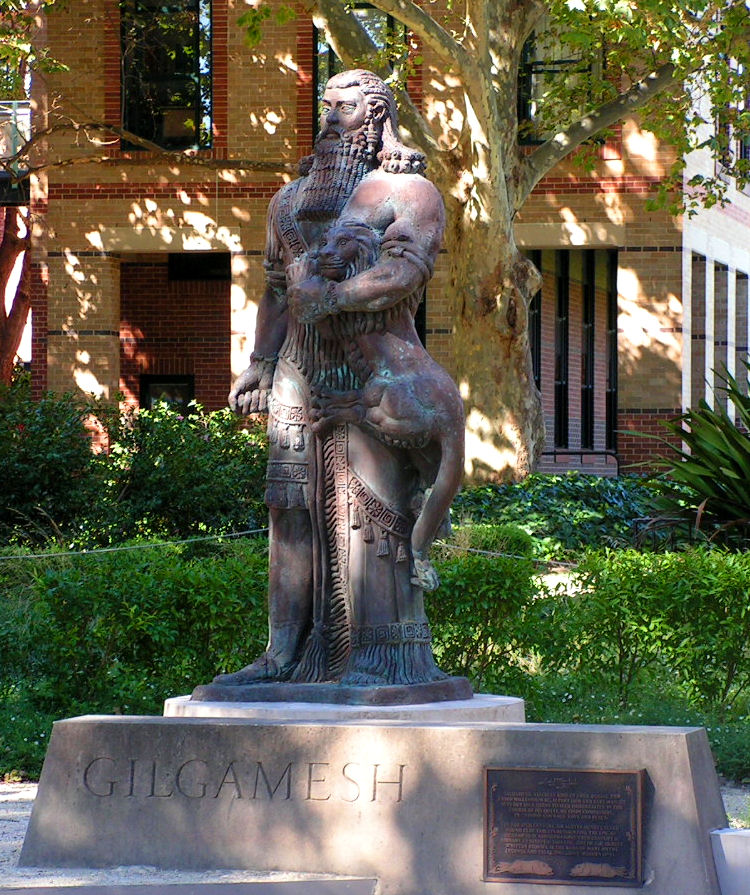So for this month's Raiding the Stacks I decided to go way way back to the beginning of the written word with the Epic of Gilgamesh! Well, okay, about two or three thousand years after we started writing things down, but the Epic of Gilgamesh is roughly four thousand years old and is the oldest story known to modern humans. Of course we only know the epic in a highly fragmented form today, even clay tablets can be worn down by time, but the the exploits of Gilgamesh and his friend Enkidu remain relevant to a twenty-first century audience.
The Epic of Gilgamesh, as we know it today, appears to be a collection of fragments from earlier stories of Mesopotamian civilizations. (I am referencing largely the gloss from the free version for the Kindle from Amazon in this paragraph.) Mesopotamia saw a number of successive civilizations whose cultures built upon and expanded the previous cultures. As such the story of Gilgamesh, at least according to scholarly research, is a retelling and elaboration of previous stories that existed in previous cultures. Evidence of this gradual retelling includes the existence of Gilgamesh's companion Enkidu who appears to be the hero of an earlier story that was melded with the later story of Gilgamesh.
In regards to the plot, which as I mentioned is largely fragmented, we begin with Enkidu who is created by the gods as a rival to Gilgamesh but lives out in the fields as a wild animal. Eventually Enkidu is brought to civilization and after an initial fight with Gilgamesh becomes his boon companion. Eventually, after many adventures, Enkidu is struck down by the goddess Ishtar and dies which prompts Gilgamesh to undertake a final great quest to find the secret of immortality and escape the clutches of death himself. Ultimately Gilgamesh is fruitless in his quest for immortality and is advised to not only enjoy life now, but ensure the proper observation of burial rites to ensure the well-being of the spirits of the dead.
The story of Gilgamesh is, as most stories we have from years with BCE behind them, a myth. Now, I should point out that myth from a historical and anthropological perspective has a very different meaning from the regular English vernacular. In the case of the vernacular a myth is something fantastical which has no existence in reality; Bigfoot and the Loch Ness Monster for example. From an anthropological and historical perspective, however, myth generally means a story which is passed down within a culture that attempts to convey specific information to succeeding generations. Myths are especially useful for cultures without a formal education system because they can convey to successive generations important practices necessary for survival. In the example of the Gilgamesh myth it conveys a few very important messages in its content.
First, as I mentioned before, the Epic of Gilgamesh talks about the importance of observing burial rites to ensure the well-being of the spirits of the dead as well as the importance of enjoying life while you can. The second message, which was gone about at great length in the gloss of one of the versions I read, was the importance of cities and civilized life for mankind. This particular message is included in the story of Enkidu and his gradual evolution from little more than a beast of the field to a civilized and cultured warrior. This is of particular interest from an anthropological standpoint because this message is actually contrary to the message contained within the Torah. The Hebrew scriptures, for the most part, idealizes a pastoral and nomadic existence and disparages a life of cities and toil. Specific mention is made of Cain, who is cursed to toil forever by the Hebrew god and is the founder of the first city. It is a very interesting contrast between two geographically similar cultures and I think it's an interesting field for future research.
Ultimately the Epic of Gilgamesh attempts to answer humanity's persistent questions regarding our mortality and it seems in four thousand years we haven't come up with many more answers. I must admit that because of its largely fragmented form the epic makes for fairly poor reading, and its interest is largely from a historical and anthropological perspective. While it was a very interesting research project for myself, I must admit it probably would not have much interest for a majority of my readers.
- Kalpar


I had never considered the contrast of Gilgamesh (city life) with Torah (goat herders). That is an interesting research topic, perhaps.
ReplyDeleteYeah, it was an interesting topic they brought up in the gloss of the Epic. Carvan's got a post later this week going into that topic further in depth because that's more his forte. I also should reiterate that the contrast between the Gilgamesh Epic and the Torah is not my idea, that was the lovely researchers who wrote the foreword. Just so I don't get credit for someone else's idea.
Delete